The AMD 3rd Gen Ryzen Deep Dive Review: 3700X and 3900X Raising The Bar
by Andrei Frumusanu & Gavin Bonshor on July 7, 2019 9:00 AM EST** = Old results marked were performed with the original BIOS & boost behaviour as published on 7/7.
Benchmarking Performance: CPU Encoding Tests
With the rise of streaming, vlogs, and video content as a whole, encoding and transcoding tests are becoming ever more important. Not only are more home users and gamers needing to convert video files into something more manageable, for streaming or archival purposes, but the servers that manage the output also manage around data and log files with compression and decompression. Our encoding tasks are focused around these important scenarios, with input from the community for the best implementation of real-world testing.
All of our benchmark results can also be found in our benchmark engine, Bench.
Handbrake 1.1.0: Streaming and Archival Video Transcoding
A popular open source tool, Handbrake is the anything-to-anything video conversion software that a number of people use as a reference point. The danger is always on version numbers and optimization, for example the latest versions of the software can take advantage of AVX-512 and OpenCL to accelerate certain types of transcoding and algorithms. The version we use here is a pure CPU play, with common transcoding variations.
We have split Handbrake up into several tests, using a Logitech C920 1080p60 native webcam recording (essentially a streamer recording), and convert them into two types of streaming formats and one for archival. The output settings used are:
- 720p60 at 6000 kbps constant bit rate, fast setting, high profile
- 1080p60 at 3500 kbps constant bit rate, faster setting, main profile
- 1080p60 HEVC at 3500 kbps variable bit rate, fast setting, main profile
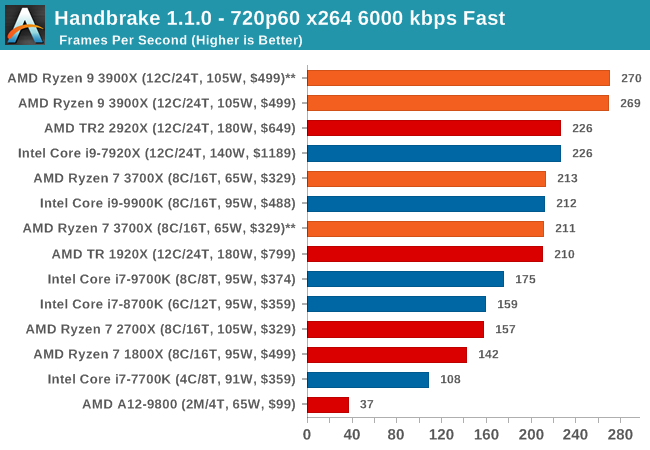
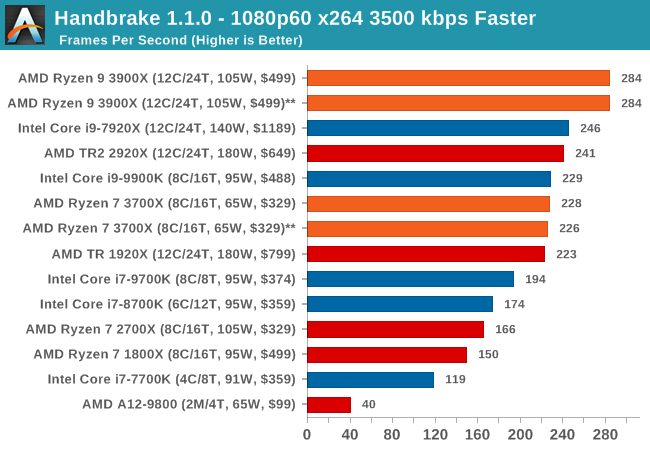
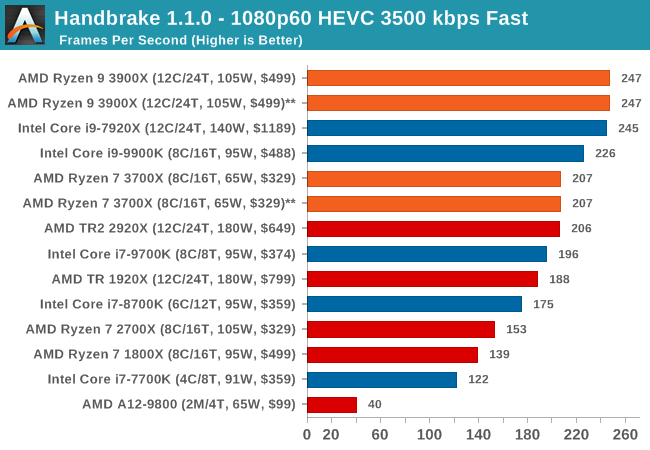
7-zip v1805: Popular Open-Source Encoding Engine
Out of our compression/decompression tool tests, 7-zip is the most requested and comes with a built-in benchmark. For our test suite, we’ve pulled the latest version of the software and we run the benchmark from the command line, reporting the compression, decompression, and a combined score.
It is noted in this benchmark that the latest multi-die processors have very bi-modal performance between compression and decompression, performing well in one and badly in the other. There are also discussions around how the Windows Scheduler is implementing every thread. As we get more results, it will be interesting to see how this plays out.
(Please note, if you plan to share the Compression graph, we'd appreciate it if you could please include the Decompression graph as well. Otherwise you’re only presenting half of the picture)
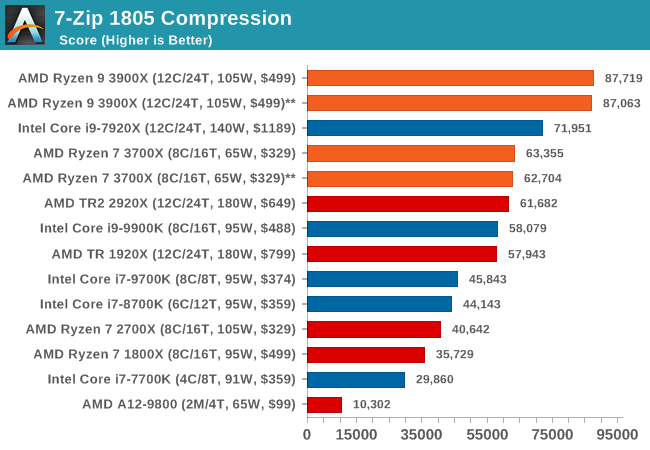
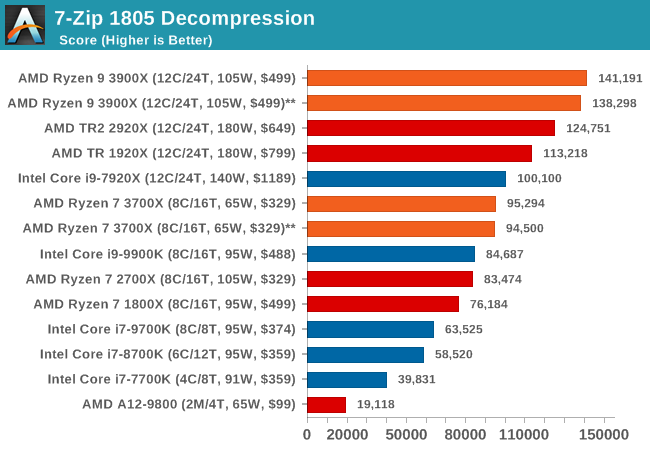
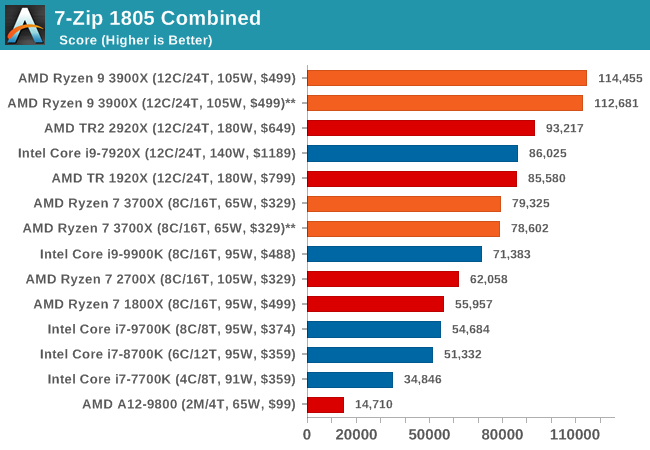
WinRAR 5.60b3: Archiving Tool
My compression tool of choice is often WinRAR, having been one of the first tools a number of my generation used over two decades ago. The interface has not changed much, although the integration with Windows right click commands is always a plus. It has no in-built test, so we run a compression over a set directory containing over thirty 60-second video files and 2000 small web-based files at a normal compression rate.
WinRAR is variable threaded but also susceptible to caching, so in our test we run it 10 times and take the average of the last five, leaving the test purely for raw CPU compute performance.
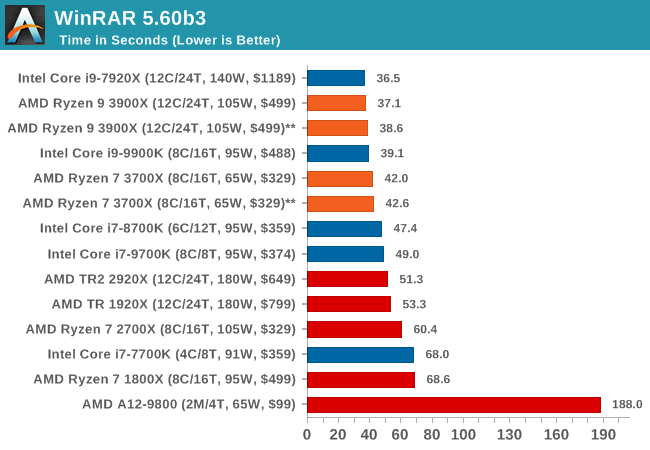
AES Encryption: File Security
A number of platforms, particularly mobile devices, are now offering encryption by default with file systems in order to protect the contents. Windows based devices have these options as well, often applied by BitLocker or third-party software. In our AES encryption test, we used the discontinued TrueCrypt for its built-in benchmark, which tests several encryption algorithms directly in memory.
The data we take for this test is the combined AES encrypt/decrypt performance, measured in gigabytes per second. The software does use AES commands for processors that offer hardware selection, however not AVX-512.
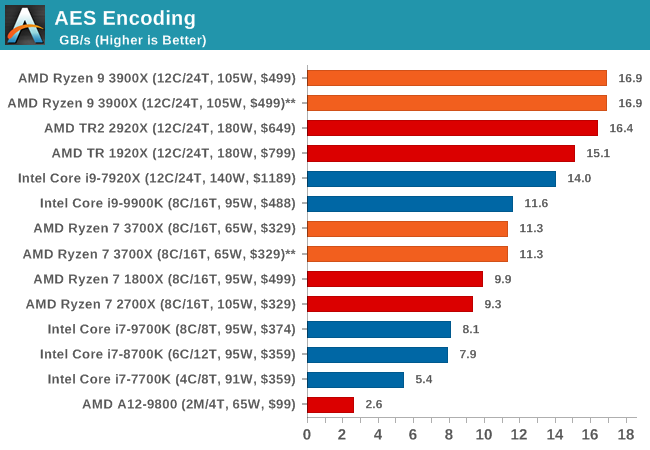










447 Comments
View All Comments
Andrei Frumusanu - Sunday, July 7, 2019 - link
CPUs are designed with memory latencies in mind when clocking at a certain clock - the current comparison at slightly different clocks is still perfectly valid for IPC.RSAUser - Monday, July 8, 2019 - link
Then show a power difference since the 9900K is double the draw...Mugur - Monday, July 8, 2019 - link
Done by other sites / youtube channels (at 4 Ghz). Ryzen 3000 is destroying Intel at the same clock.isthisavailable - Sunday, July 7, 2019 - link
With improved 7nm+ process for next gen, AMD can hit 5ghz and take the single core crown.Maxiking - Sunday, July 7, 2019 - link
Just like they did with the 14nm+ aka 12nm.Just like they were supposed to do with this gen.
But, but, but..?
sor - Sunday, July 7, 2019 - link
Actually that’s a bad example because we did see 200-300mhz bumps each generation between Ryzen 1000 and 3000. At that pace it’s possible to see a 5ghz turbo next generation, or be close enough.If you’re saying that everyone expected 5ghz with Ryzen 2000, then yes, if that’s true then those people were being unreasonable. At this point though it’s not a big leap.
Maxiking - Sunday, July 7, 2019 - link
It is a perfectly valid example, the bump between 1st gen and 2ng gen ryzen was 200mhz. Max OC on 1st gen was 4.1ghz, the max on the 2nd gen was 4.3ghz.There is no bump this year. I am highly skeptical they would be able to reach 4.6ghz on all cores with 7 nm+ next year. TSMC nodes are nothing special, you hit the wall and you are done regardless of voltage used.
sor - Sunday, July 7, 2019 - link
last year we had 3.7/4.3ghz as the flagship Ryzen 7 desktop. This year we get 3.9/4.5ghz in Ryzen 7 and up to 4.7ghz single threaded in Ryzen 9.These parts are well beyond anything we saw in the 2000 series, to claim there has been no frequency improvement is disingenuous at best. Going to 5ghz is just a small process tweak away this time.
Maxiking - Sunday, July 7, 2019 - link
Yeah and we were promised 3900x boosting up to 4.6ghz and it barely boost to 4.2ghz and can be manually overclocked to 4.3ghz.I will believe when I see it.
So no, there is no frequency boost with these chips.
Mugur - Monday, July 8, 2019 - link
You are wrong, 3900 is boosting to 4.55-4.6 single core all day.